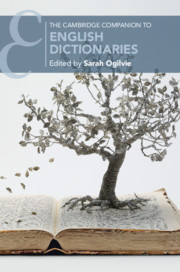Book contents
- The Cambridge Companion to English Dictionaries
- The Cambridge Companion to English Dictionaries
- Copyright page
- Dedication
- Contents
- Illustrations
- Tables
- Notes on Contributors
- Acknowledgements
- Chronology
- Chapter 1 Introduction
- Part I Issues in English Lexicography
- Part II English Dictionaries Throughout the Centuries
- Part III Dictionaries of English and Related Varieties
- Chapter 20 Dictionaries of Canadian English
- Chapter 21 Australian Lexicography: Defining the Nation
- Chapter 22 New Zealand’s Lexicographic Legacy
- Chapter 23 Hobson-Jobson and Dictionaries of Indian English
- Chapter 24 South African English Dictionaries: From Colonial to Post-Colonial
- Chapter 25 Dictionaries of Caribbean English: Agents of Standardisation
- Chapter 26 Dictionary of American Regional English
- Chapter 27 The Scottish Dictionary Tradition
- Guide to Further Reading
- Index
- Cambridge Companions to Literature
Chapter 27 - The Scottish Dictionary Tradition
from Part III - Dictionaries of English and Related Varieties
Published online by Cambridge University Press: 18 September 2020
- The Cambridge Companion to English Dictionaries
- The Cambridge Companion to English Dictionaries
- Copyright page
- Dedication
- Contents
- Illustrations
- Tables
- Notes on Contributors
- Acknowledgements
- Chronology
- Chapter 1 Introduction
- Part I Issues in English Lexicography
- Part II English Dictionaries Throughout the Centuries
- Part III Dictionaries of English and Related Varieties
- Chapter 20 Dictionaries of Canadian English
- Chapter 21 Australian Lexicography: Defining the Nation
- Chapter 22 New Zealand’s Lexicographic Legacy
- Chapter 23 Hobson-Jobson and Dictionaries of Indian English
- Chapter 24 South African English Dictionaries: From Colonial to Post-Colonial
- Chapter 25 Dictionaries of Caribbean English: Agents of Standardisation
- Chapter 26 Dictionary of American Regional English
- Chapter 27 The Scottish Dictionary Tradition
- Guide to Further Reading
- Index
- Cambridge Companions to Literature
Summary
This chapter surveys the history of Scottish dictionaries from their beginnings to the present day, highlighting key historical lexicographers and their contributions to the documentation of the Scots language. Acknowledging the wide-ranging impact that Scottish dictionary-makers have had on the global stage, the discussion focuses on the perceptions of Scots over time and the impact this has had on the types of resources available for its study. Early pioneers including Thomas Ruddiman and John Jamieson are discussed and contextualised. Ruddiman’s influential glossary (1710) supported readers of Gavin Douglas’s translation of Virgil’s Aeneid, while Jamieson, like the Scottish poets of the eighteenth-century Vernacular Revival, sought to preserve and celebrate the language. Twentieth-century and present-day practitioners and their objectives are also considered. The editorial team at Scottish Language Dictionaries, led by Rhona Alcorn, are both educators and curators, building on the legacies of DOST and SND under the banner of the Dictionary of the Scots Language (www.dsl.ac.uk) and working to maintain the status of Scots as a living language while enhancing its appreciation and acceptance.
Keywords
- Type
- Chapter
- Information
- The Cambridge Companion to English Dictionaries , pp. 315 - 323Publisher: Cambridge University PressPrint publication year: 2020

